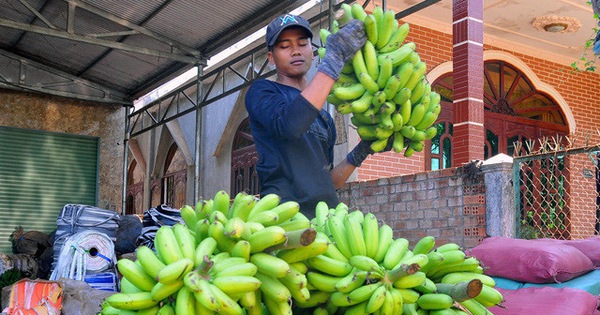 Economy
Economy

Recognition that there’s a growing market for safe agricultural produce is pushing several localities to pursue ways and means to advance clean agriculture.

|
| Bananas grown in Gia Lai province according to GlobalGAP standards has helped farmers earn handsome profits. Photo tuoitre.vn |
HCM CITY — Recognition that there’s a growing market for safe agricultural produce is pushing several localities to pursue ways and means to advance clean agriculture.
Đoàn Ngọc Có, deputy director of the Gia Lai Department of Agriculture and Rural Development, said that the Central Highlands province will focus on expanding the area of banana and passion fruit cultivation under GlobalGAP standards.
He said the area of passion fruit and banana in the province will increase to about 20,000ha and 9,000ha, respectively, by 2025. This will bring the total area of fruit trees meeting GlobalGAP standards from 21,500ha at present to 55,000ha in 2025 and 100,000ha in 2030.
The province plans that passion fruit, banana, avocado and durian become its main agriculture export produce. So far, banana has proved particularly lucrative with profits of VNĐ350-400 million (US$15,200-17,400) per hectare, helping farmers stabilise their livelihoods, Có said.
Next the province will develop a process to promote organic farming and economical irrigation to grow fruit trees in a sustainable way, he added.
The Cửu Long (Mekong) Delta province of Sóc Trăng, meanwhile, has expanded organic farming, finding that it helps reduce production costs, is sustainable and the produce has steady demand.
The province has 15,400ha devoted to organic farming, including 5,000ha of rice, 2,500ha of vegetables and 7,900ha of fruits.
With a coastline of 72km and farming areas accounting for 84.7 per cent of the land surface, the province enjoys clear advantages in developing agriculture.
Under a restructuring plan, it has “suitably arranged crop cultivation” and introduced advanced cultivation techniques to increase value of its produce.
Huỳnh Ngọc Nhã, director of the province’s Department of Agriculture and Rural Development, said the plan helped increase annual production value to VNĐ207 million ($11,600) per hectare last year, VNĐ130 million ($5,600) higher than 10 years ago.
The cultivation of high-quality and specialty rice varieties has increased to 240,100ha, up from just 5,000ha in 2000, and accounting for 73.2 per cent of the total.
The province is increasing the cultivation of these rice varieties, especially ST 24 and ST 25, which were created by local scientists and are among the world’s best.
It has increasingly mechanised farming over the years, and now 98 per cent of rice is harvested by machines.
It has helped co-operatives develop 17 fruit-growing models that have received production codes for export.
Its Plant Protection Sub-department has granted the codes to 75 areas growing milk apple, grapefruit, mango and longan on a total of 497ha as of last year.
The province exports the fruits to the US, EU and other markets.
Trần Văn Lâu, chairman of the province People’s Committee, said that in the future, green agriculture with organic, circular and digital farming measures would be prioritised.
But development of green agriculture needed co-operation between farmers, co-operatives, companies, and local authorities, he said.
Relevant authorities should strengthen their advocacy to increase public awareness of organic produce, he said.
The province plans to spend more than VNĐ67.6 billion ($2.9 million) by 2030 on its organic agriculture plan.
“The plan aims to link four stakeholders - farmers, scientists, companies, and local authorities - to develop organic farming of some products,” Nhã said.
To help boost consumption of organic farm produce, the connection between producers and distributors is key, experts have said.
They have also said that stronger linkages between farmers and businesses will help both producers and distributors become more active in production and consumption, thus helping reduce loss and prevent situations of a big drop in prices due to abundant supply.
In particular, they have stressed the need for the Government and localities to organise more workshops to help farmers present high-quality products to businesses and consumers. — VNS




